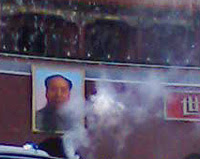The State Departments, Ministeries of nations able to facilitate a 'FREER press' in countries capable of providing it have to provide guidelines for the practice. The Safe Practice. Promoting unrest recklessly without good alternatives in government can lead to anarchy and with a population of one billion people that is a lot hardship. Responsible journalism that brings the issues of the populous to the attention of authority without risk of disrupting the society so much that it can't care of it's people is the only way a professional standard can be developed. This isn't pity. It is knowing the power of knowledge, the power of information, the power of motivation and applying it responsibly.
Countries with different structure than the USA, the EU, Australia and the like need to ALLOW a transcendence of the 'authority' of journalism that provides quality of life. In the USA the politics are the 'release' for the change people seek. In countries like China, respect of authority while bring people closer to that authority and will move mountains without victimizing the professionals that seek a better life for the towns, city, hamlets and villages. Countries like China and Russia get such a bad rap from the press in countries they trade with that it causes a deterioration of the quality of life within it's borders. These countries don't need diminishment of their poeple, they need a higher dignity placed on them.
Bridging the professional gap between journalism and government while promoting positive experiences of press corps internationally will make the journalistic experience more fulfilling for all people. I have yet to see 'on the ground' promotion of the 2008 Olympics from Chinese journalists that can provide insight and interviews from the 'workers' in China that took pride in their efforts to make it all possible. Why?

During riots

Tiananmen incident ... workers clean the picture of Chairman Mao at the entrance to the Forbidden City in Beijing.
On Saturday, May 12, an unemployed Xinjiang man lobbed an incendiary device at the iconic portrait of Mao Zedong that hangs over the entrance to the Forbidden City (or the Palace Museum as the Chinese call it). Here's a photograph, taken on a mobile phone camera, of Mao's portrait burning. The witness who took the photograph was driving by moments after the painting caught alight and said he saw flames coming from the bottom of the portrait, then some sort of foam shooting upwards, presumably from the fire brigade, to extinguish the fire, then just the smoke.
In the south-west, villagers have been rioting over oppressive enforcement of China's one-child policy. Coverage of both events was censored within China, but footage of the rioting in Guangxi has been widely posted on blogs accessible in Hong Kong, which although returned to Chinese rule in 1997, under the one country, two systems deal worked out with the British, enjoys a greater deal of press and other freedoms for the first 50 years of its post-colonial life.
International media such as CNN have also broadcast footage of the aftermath of the rioting, but predictably whenever the story was promoted as ''coming up next'', or the footage shown, the television screen went blank, although technical glitches meant mainland viewers still got the announced headline of the story. Such clumsy censorship is common on any stories considered sensitive by the Government, despite satellite or cable stations such as CNN and BBC (the BBC website is banned in China, although the broadcast station is not) being ostensibly only permitted in diplomatic compounds, residential areas where foreigners live, big hotels etc, far away from the eyes of most ordinary Chinese. But of course this is China, and anyone who wants satellite television can simply pay for a dish ... hence the need to censor sensitive topics in case such events - as rioting villagers fed up with corrupt or overzealous bureaucrats - gets too widely disseminated and creates flow-on social unrest, ie. gives people ideas.
The Government's justification for censorship is that its overriding interest is to maintain social order. In the case of the attack on Mao's portrait, many Chinese, who still respect and even revere the late paramount leader who, for all his subsequent mistakes, restored China's pride after a century of humiliation at the hands of Western powers, would be outraged. And many people understand and accept, even if they don't like, the Government's one-child policy because as people are wont to say ''it is for the good of the nation''. The issue in Guangxi appears to be not so much the policy as such but the corrupt and brutal way the authorities chose to enforce and collect fines. So why can't the Chinese public be allowed to know of and debate such issues?